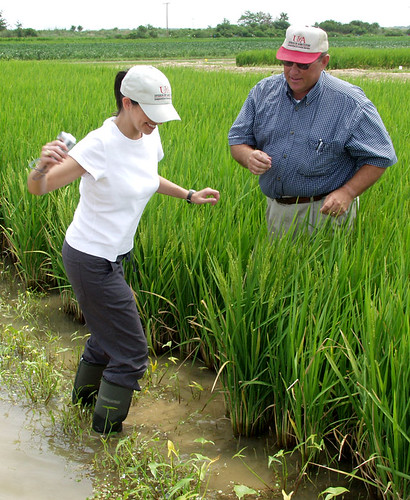Flooded fields: Let’s do the rice walk again
By Mary HightowerU of A System Division of Agriculture
Fast Facts:
-
- Walking through flooded rice fields not as easy as it looks
- Rule No. 1: Don’t fall
- Keep electronics in the truck
- “You always find which boots have holes in them.” - Keith Perkins
(390 words)
STUTTGART, Ark. – Gliding through flooded fields with nary a wake, the professionals make rice walking look easy. It’s anything but.
The bottom can be slick. The mud tugs at your boots. The water is always deeper than expected and the levees are foot catchers. However, it’s a necessary part of raising the crop in Arkansas, the nation’s No. 1 rice grower.
So how do the pros manage it without coming a cropper?
Jarrod Hardke, extension rice agronomist for the University of Arkansas System Division of Agriculture, offers his top five tips for rice walking:
5. Make sure your boots are tall enough for the water in which you’re walking.
4. Be tall – it’s easier to cross levees.
3. Leave electronics in the truck.
2. Ditches and washouts are always deeper than you think.
… and the No. 1 rule of rice walking: Don’t fall.
Keith Perkins, Lonoke County extension agent for the Division of Agriculture has about 40 years of rice walking under his boots.
“It is always easier before the flood,” he said with a laugh. “As my dad would say, ‘someone has to walk those fields and today looks like our day. You can’t tell much from the truck window. You’ve got to get out there where the problems are and fix them’.”
Just the other day, Perkins said “I filled one of my boots up when installing a flow meter. That's why an extra pair of socks and dry boots are nice to carry. Growing up, we all just went in our tennis shoes but that leads to water buildup in your floorboard.”
As the voice of experience, Perkins has some splashes of wisdom for any rice walker:
-
- “When the rice gets waist high you need rain pants or really tall boots or you will get soaked from the dew first thing in the morning.”
- "You always find which boots have holes in them.”
- "It is always farther back to the truck than you think.”
- “That buzzing sound is not a good thing.”"
- “Never walk right in front of a well because there’s normally a big hole and that water is cold.”
- Stay hydrated. “Let me tell you, relift water is not the same as from the pump and is not very good.”
For more information about rice production, visit your county extension office, www.uaex.uada.edu or http://arkansascrops.com.
The Arkansas Cooperative Extension Service is an equal opportunity institution. If you require a reasonable accommodation to participate or need materials in another format, please contact your County Extension office (or other appropriate office) as soon as possible. Dial 711 for Arkansas Relay.
Pursuant to 7 CFR § 15.3, the University of Arkansas System Division of Agriculture offers all its Extension and Research programs and services (including employment) without regard to race, color, sex, national origin, religion, age, disability, marital or veteran status, genetic information, sexual preference, pregnancy or any other legally protected status, and is an equal opportunity institution.
# # #
Media Contact: Mary Hightower
Dir. of Communication Services
U of A Division of Agriculture
Cooperative Extension Service
(501) 671-2126
mhightower@uada.edu
Related Links
